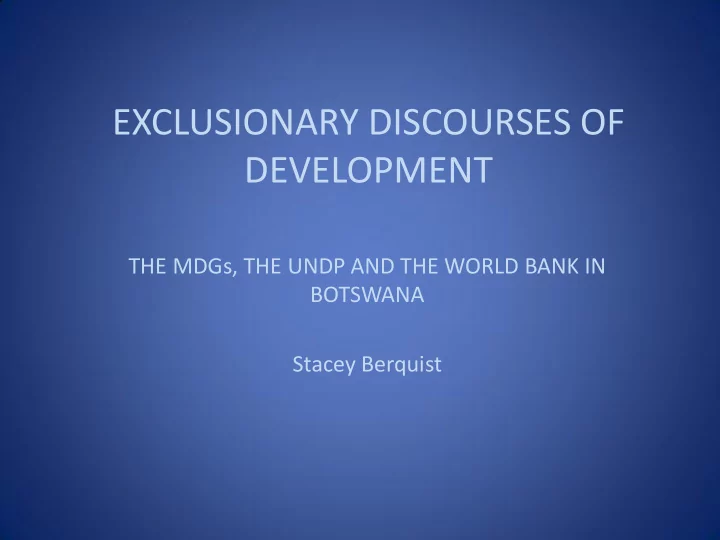

EXCLUSIONARY DISCOURSES OF DEVELOPMENT THE MDGs, THE UNDP AND THE WORLD BANK IN BOTSWANA Stacey Berquist
RESEARCH QUESTIONS • What development discourse is being propagated by the MDGs? • How does that discourse play out in the actual policies of the UNDP and World Bank? • What are the implications of these constructions of development? Stacey Berquist 2012
FRAMEWORK • Postcolonial theory – Critical insights and methods of poststructural theory – But has its own project of specific critique of colonialism and its legacies – Focus on colonial power relations and identities – Offers the possibility of alternative ideas and outcomes Stacey Berquist 2012
METHODOLOGY • Discourse analysis of first MDG to ‘eradicate extreme poverty and hunger’ and its supporting documents • DA of UNDP and World Bank policies for Botswana to ground the analysis – UNDP Draft Country Programme for Botswana 2010-2014 – World Bank Country Partnership Strategy 2009- 2013 Stacey Berquist 2012
THE MILLENNIUM DEVELOPMENT GOALS – Dollar-a-day discourse (median of 10 poorest countries’ poverty lines) – Poverty is exclusively economic and once we reach that barest of targets, poverty is ended – Issue of inequality is excluded – Tension of ideas within even the UNDP itself: • HDR 2000 report claims to ‘secure, for every human being, freedom, well- being and dignity’ Stacey Berquist 2012
MILLENNIUM DEVELOPMENT GOALS • Halving of hunger – Hunger here measured as minimum caloric intake required to meet basic energy needs – Depoliticised, biologically defined notion of hunger – Tension with WFP notion of food access and security • ‘A world in which every man, woman and child has access at all times to the food needed for an active and healthy lifestyle’ Stacey Berquist 2012
THE MILLENNIUM DEVELOPMENT GOALS • Discourse of exclusion – Only the issues addressed by the Goals are relevant – The solutions are only to be found through market integration and trade – Only some actors have the expertise to advise others on what they need to do, and how to do it – Implicit understanding that ‘we’ the international community does not include the poor Stacey Berquist 2012
UNDP DRAFT COUNTRY PROGRAMME • Explicit adoption of MDGs into specific policy construction • Strong focus on need for measurement and data collection and the natural role of the UNDP in conducting such research • Reinforcement of market strategies of development; necessity of private-sector development and ‘inclusive globalisation’ for poverty reduction Stacey Berquist 2012
WORLD BANK COUNTRY PARTNERSHIP STRATEGY • Parallels with UNDP policy • Rigorous support for market-based solutions to poverty and the key to development • Bank’s rightful, neutral role as expert advisor, capacity builder and its natural place within developing countries Stacey Berquist 2012
IMPLICATIONS • A limitation of our understandings of poverty and hunger to basic economic and biological measures – a depoliticisation • A discourse in which people who live in poverty should have lower expectations – and in which wealthier people’s responsibilities are limited • Development is defined as entry into world economic markets, a certain GDP and a basic economic standard of living Stacey Berquist 2012
Recommend
More recommend